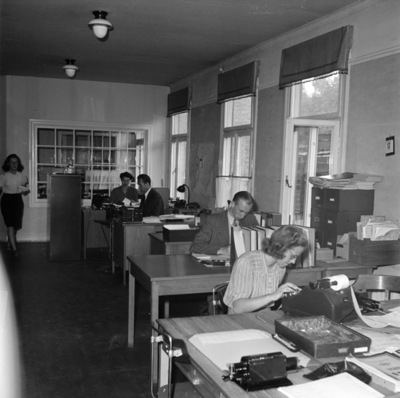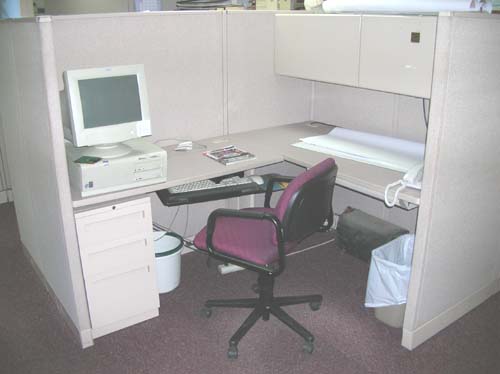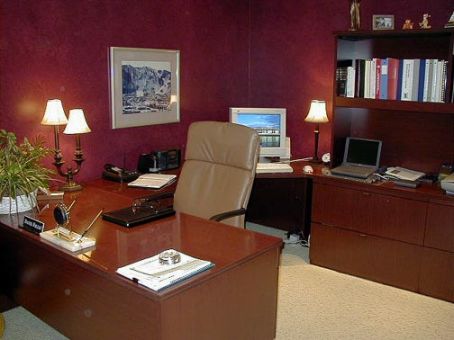Cubicle Justice
Having now worked out in the world for several years, I've come to an understanding about something. If you work in a cubicle, It doesn't seem to matter how comfortable or "Class-A" it is. The intent in its design is clear: subordination. You are in a cubicle, and you therefore are beneath someone else. Your role is to be "under" someone else. This fact has been made clear to me by the structure and layout of the cubicle. Allow me to elaborate.

Take this old picture, for example. This is an average shared office-like workplace from probably about 60 years ago. Look at all the people. They're all pretty visible from throughout the room, but even without partition walls between them, they each have a modicum of privacy. Look at how their tables and desks are all perpendicular to the wall, and not flush against it. Their backs are to nothing in particular. If someone comes to talk with one of them, they only need to look up. They don't need to turn around.

Compare that to the average cubicle of today. The partition separates and isolates the occupant from coworkers. The only privacy the occupant is afforded is from his/her contemporaries. If anyone approaches the cubicle, the occupant's back is to them, which means that while the occupant is working, all they do is visible for any passerby, but especially to management. The occupant knows that their boss can see whatever it is that they're doing, just by approaching the cubicle. This means that the overarching motif is fear. The design goal is for occupants to be productive not for the sake of productivity, but for fear of getting in trouble.
To further reinforce the intent behind modern office design, let's have a look at a typical managerial office.

The door to this room is off to the left, or possibly the right, but certainly in such a position that the occupant of the office can see who's there, and face them with a piece of authoritative furniture between themselves and the visitor. The theme of the manager's office is comfort and authority, as opposed to the theme of the cubicle, which is vulnerability and fear.
I've worked in many cubicles over the years, and they've all been similar enough to the one pictured above that the main points I stressed were consistent. When I worked at Sprint, I remember that I didn't like what I was doing on my computer to be visible to anyone who came close. So I moved my computer to a part of the desk that allowed me to face the entrance of my cubicle. This way, my computer screen faced only me, and I could see when people visited me.
My boss, Barbara, was very opposed to this idea, and cited this rearrangement in a write-up she composed after I'd been there a short time. She didn't like that she couldn't see what I was doing on my computer. She didn't like that she couldn't surprise me anymore. She was very accusatory in her tone. "What are you trying to hide?" she would ask. "It's very paranoid that you would do this." The simple truth at the time was that I didn't like people tapping my shoulder without me knowing they were there, but thinking back I realize that I felt like a subject of management, and not like a valued employee.
Every manager I've ever had has had an office with a desk that allowed them to face the door. In addition, they would always put their computer in a position to allow them to see who was coming at all times. Nobody ever claimed that the people in management were paranoid, or trying to hide anything. Such ideas didn't enter people's minds. Indeed I'm sure they were looking at youtube and facebook too, just like everyone else. But they had no need to worry about whether anyone could see it.
So why does a cubicle dweller not only work in fear of reprisal, owing to the default layout of their allotted work space, but the manager is above reproach? Don't even take into account things like managerial incompetence or hypocrisy, or whatever other charges you can levy against any manager you've ever had. Look past all of that and ask yourself, why don't we ever wonder what they're looking at on their computer? We certainly worry about them seeing what we're doing. Why does the term, "time theft" only seem to apply to cubicle-dwellers? Even the dwellers themselves don't generally think about what their managers are doing, if it doesn't relate directly to what they themselves are doing.
We have an office layout system now that encourages discipline with fear, and work ethic through paranoia. It seems like a problem to me.
Having now worked out in the world for several years, I've come to an understanding about something. If you work in a cubicle, It doesn't seem to matter how comfortable or "Class-A" it is. The intent in its design is clear: subordination. You are in a cubicle, and you therefore are beneath someone else. Your role is to be "under" someone else. This fact has been made clear to me by the structure and layout of the cubicle. Allow me to elaborate.

Take this old picture, for example. This is an average shared office-like workplace from probably about 60 years ago. Look at all the people. They're all pretty visible from throughout the room, but even without partition walls between them, they each have a modicum of privacy. Look at how their tables and desks are all perpendicular to the wall, and not flush against it. Their backs are to nothing in particular. If someone comes to talk with one of them, they only need to look up. They don't need to turn around.

Compare that to the average cubicle of today. The partition separates and isolates the occupant from coworkers. The only privacy the occupant is afforded is from his/her contemporaries. If anyone approaches the cubicle, the occupant's back is to them, which means that while the occupant is working, all they do is visible for any passerby, but especially to management. The occupant knows that their boss can see whatever it is that they're doing, just by approaching the cubicle. This means that the overarching motif is fear. The design goal is for occupants to be productive not for the sake of productivity, but for fear of getting in trouble.
To further reinforce the intent behind modern office design, let's have a look at a typical managerial office.

The door to this room is off to the left, or possibly the right, but certainly in such a position that the occupant of the office can see who's there, and face them with a piece of authoritative furniture between themselves and the visitor. The theme of the manager's office is comfort and authority, as opposed to the theme of the cubicle, which is vulnerability and fear.
I've worked in many cubicles over the years, and they've all been similar enough to the one pictured above that the main points I stressed were consistent. When I worked at Sprint, I remember that I didn't like what I was doing on my computer to be visible to anyone who came close. So I moved my computer to a part of the desk that allowed me to face the entrance of my cubicle. This way, my computer screen faced only me, and I could see when people visited me.
My boss, Barbara, was very opposed to this idea, and cited this rearrangement in a write-up she composed after I'd been there a short time. She didn't like that she couldn't see what I was doing on my computer. She didn't like that she couldn't surprise me anymore. She was very accusatory in her tone. "What are you trying to hide?" she would ask. "It's very paranoid that you would do this." The simple truth at the time was that I didn't like people tapping my shoulder without me knowing they were there, but thinking back I realize that I felt like a subject of management, and not like a valued employee.
Every manager I've ever had has had an office with a desk that allowed them to face the door. In addition, they would always put their computer in a position to allow them to see who was coming at all times. Nobody ever claimed that the people in management were paranoid, or trying to hide anything. Such ideas didn't enter people's minds. Indeed I'm sure they were looking at youtube and facebook too, just like everyone else. But they had no need to worry about whether anyone could see it.
So why does a cubicle dweller not only work in fear of reprisal, owing to the default layout of their allotted work space, but the manager is above reproach? Don't even take into account things like managerial incompetence or hypocrisy, or whatever other charges you can levy against any manager you've ever had. Look past all of that and ask yourself, why don't we ever wonder what they're looking at on their computer? We certainly worry about them seeing what we're doing. Why does the term, "time theft" only seem to apply to cubicle-dwellers? Even the dwellers themselves don't generally think about what their managers are doing, if it doesn't relate directly to what they themselves are doing.
We have an office layout system now that encourages discipline with fear, and work ethic through paranoia. It seems like a problem to me.
1 comment
alex g commented:
Sad story. I like that my door is to my
back. It helps me focus on what I am
doing. Stinks that sprint has such bad
management.
Sad story. I like that my door is to my
back. It helps me focus on what I am
doing. Stinks that sprint has such bad
management.
12:37 PM, Sep 22, 2010
Only logged in users may enter comments.
| subscribe: | posts | comments |
| validate: | html | css |
| login: | not logged in |

